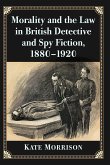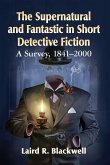This book focuses on the distinctive role that artists have played in detective fiction--as detectives, as villains and victims, and as bystanders. With a few significant exceptions, literary detectives have always identified themselves as essentially the deconstructors of the artful crimes of others. They may use various methods--ratiocinative, scientific, or hard-boiled--but they always unravel the threads that the villains have woven into deceptive covers for their crimes. The detective does, in the end, produce a work of art: a narrative that explains everything that needs explanation. But the detective's moral work is often juxtaposed to the aesthetic work of the painters, poets, and writers that the detective encounters during an investigation. The author surveys this juxtaposition in works by important authors from the early development of the genre (Poe, Conan Doyle), the golden age (Bentley, Christie, Sayers, James, et al.), and the hard-boiled era (Hammett, Chandler, Macdonald, Spicer et al.).
Hinweis: Dieser Artikel kann nur an eine deutsche Lieferadresse ausgeliefert werden.
Hinweis: Dieser Artikel kann nur an eine deutsche Lieferadresse ausgeliefert werden.








